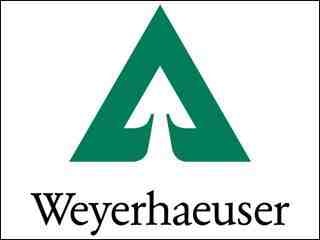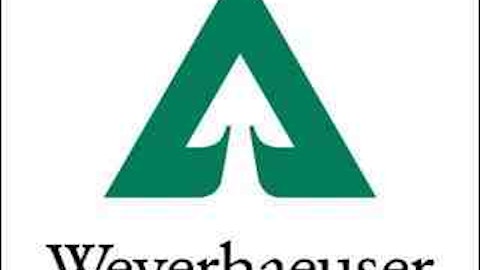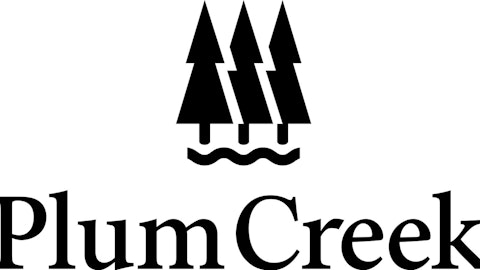A recent deal between Federal Way, Washington-based lumber REIT Weyerhaeuser Company (NYSE:WY) and Toronto-based property management firm Brookfield Asset Management Inc. (USA) (NYSE:BAM) could have important ramifications for the firms’ shareholders. Judging by its size and scope, it could have significant implications for the timber and home-building industries as well.
The core of the deal involves the exchange of Longview Timber Company, a wholly owned subsidiary of Brookfield Asset Management Inc. (USA) (NYSE:BAM) . Longview owns nearly 650,000 acres of prime timberland in the Pacific Northwest region of the United States, and its acquisition will almost certainly provide a boost to Weyerhaeuser Company (NYSE:WY)’s already-robust timber operations. For Brookfield, it will provide a $2.5 billion infusion of highly liquid stock that could provide ongoing dividend income or be expended to finance the company’s aggressive acquisition projects. However, the transaction is not a slam dunk. It will require Weyerhaeuser to resort to a secondary stock offering that could create near-term weakness in the firm’s shares.
Weyerhaeuser, Brookfield Asset Management and the Competition
Weyerhaeuser Company (NYSE:WY) is an international concern that operates in an often-overlooked and frequently maligned industry. Due to the rather staid nature of the lumber business, it is easy to forget that raw-materials firms like Weyerhaeuser are indirectly responsible for the well-being of the far more dynamic residential and commercial construction industries. As such, it would be useful to compare Weyerhaeuser Company (NYSE:WY) and Plum Creek Timber Co. Inc. (NYSE:PCL) against the Canadian asset management firm whose development projects require ongoing inputs of raw materials. It should also be noted that Weyerhaeuser’s Wreco subsidiary is gaining strength as a home-builder in its own right.
Brookfield Asset Management Inc. (USA) (NYSE:BAM) is a bit larger than Weyerhaeuser Company (NYSE:WY) and significantly heftier than Plum Creek Timber. Its $22.3 billion market capitalization exceeds that of Weyerhaeuser by nearly 50 percent and is about three times larger than Plum Creek’s. What’s more, its $1.2 billion earnings figure on 2012 revenues of $20.7 billion comfortably outpaces Weyerhaeuser’s take of $488 million on a top-line of $7.5 billion. For its part, Plum Creek took in $230 million on revenues of $1.3 billion to produce a far healthier margin. Given its far smaller revenue figures, it should be no surprise that Plum Creek’s price-to-book ratio is roughly double that of its larger competitor.
All three of these firms are highly leveraged. More importantly, Weyerhaeuser and Brookfield Asset Management Inc. (USA) (NYSE:BAM) both have less-than-ideal cash flow figures. While both remain positive, it is questionable whether Weyerhaeuser will be able to sustain its cash hoard of under $700 million with a levered free cash flow figure of less than $50 million. This may explain why Weyerhaeuser has elected to fund the Longview deal with a partial equity sale.
How the Deal Will Work
Under the terms of the deal, Weyerhaeuser will use a combination of debt and equity sales to fund the all-stock Longview purchase. Although the exact price point at which Weyerhaeuser will issue stock to Brookfield Asset Management Inc. (USA) (NYSE:BAM) is unclear, the Canadian firm looks to be getting a favorable deal. In fact, reliable estimates indicate that Weyerhaeuser may be overpaying by as much as 30 percent. In any event, the transaction will permit Weyerhaeuser shareholders to grab a limited tranche of the company’s shares at a slightly discounted $27.75 price point. Both companies have indicated that the deal should close by the middle of the summer of 2013.
Financing and Other Issues
Given Weyerhaeuser’s growing debt load and potential cash flow problems, it is important that the company will reap as much as $800 million from its secondary offering. However, this still puts Weyerhaeuser in a tough spot. It will need to raise nearly $2 billion through traditional debt offerings. It is hoped that the additional revenue from Longview’s holdings will permit the company to reduce, or at least stabilize this debt load.
Weyerhaeuser has also indicated that it intends to spin off its Wreco subsidiary in a deal that could create additional value for its shareholders. Since Wreco took in at least $1 billion in revenues in 2012, this would not be an insignificant development. As an indirect result of this transaction, Weyerhaeuser expects to be able to increase its quarterly dividend by 10 percent.
How Longview Stacks Up
Longview’s land portfolio includes hundreds of thousands of acres of prime timberland parcels in the Cascade Range. This land has been well managed and much of it is ready for harvest. Compared to Weyerhaeuser’s other holdings in the Great Lakes and Northern Tier regions, Longview’s portfolio may well contain a higher density of mature, marketable timber that can be used in residential construction applications. As such, Weyerhaeuser’s management team does not seem to be troubled by its steep price tag.
Potential Synergies, Savings and Long-Term Outlook
Many market-watchers believe that the Longview purchase will enable Weyerhaeuser to ramp up its exports to timber-starved Japan in relatively short order. After the purchase, roughly one-third of Weyerhaeuser’s portfolio will consist of Pacific Northwest timberland. Since it is less expensive to ship raw or processed timber to Tokyo from Seattle than from Minneapolis or New York, this is a significant development. As a direct result, Weyerhaeuser expects to realize at least $20 million in annual cost savings and synergies from this deal.
In sum, this transaction offers concrete benefits for both companies. Although Weyerhaeuser’s shareholders may be disappointed by its secondary offering, the temporary weakness that it engenders could produce an exciting buy-in point for longer-term shareholders. What’s more, the potential Wreco spin-off is sure to provide an additional reason to stay engaged with the stock. However, it is crucial that investors research the terms of the Longview deal on their own before committing to a position.
The article How This Company Is Aiming Big With a $2.6 Billion Deal originally appeared on Fool.com and is written by Mike Thiessen.
Mike Thiessen has no position in any stocks mentioned. The Motley Fool has no position in any of the stocks mentioned. Mike is a member of The Motley Fool Blog Network — entries represent the personal opinion of the blogger and are not formally edited.
Copyright © 1995 – 2013 The Motley Fool, LLC. All rights reserved. The Motley Fool has a disclosure policy.




